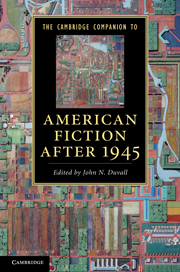Book contents
- Frontmatter
- Introduction: A story of the stories of American fiction after 1945
- PART I POETICS AND GENRES
- 1 Postmodern metafiction
- 2 Contemporary realism
- 3 New journalism and the nonfiction novel
- 4 Science fiction
- 5 The short story
- PART II HISTORICAL AND CULTURAL CONTEXTS
- PART III MAJOR AUTHORS
- Conclusion: Whither American fiction?
- Index
- Cambridge Companions to …
1 - Postmodern metafiction
from PART I - POETICS AND GENRES
Published online by Cambridge University Press: 28 March 2012
- Frontmatter
- Introduction: A story of the stories of American fiction after 1945
- PART I POETICS AND GENRES
- 1 Postmodern metafiction
- 2 Contemporary realism
- 3 New journalism and the nonfiction novel
- 4 Science fiction
- 5 The short story
- PART II HISTORICAL AND CULTURAL CONTEXTS
- PART III MAJOR AUTHORS
- Conclusion: Whither American fiction?
- Index
- Cambridge Companions to …
Summary
Metafiction is fiction that calls attention to its representational techniques and knowledge claims. However, metafiction is something neither new nor inherently American. As Gerald Prince has noted, the novel, as a genre, harbors a range of possible narrative strategies that include metanarrative constructions such as self-reflexivity, and this accounts for why novels with metafictional elements appear at different historical moments, well before the second half of the twentieth century. Citing fiction from numerous literary periods, Robert Alter defines metafiction within the larger category of “self-conscious fiction,” as does Brian Stonehill, who defines metafiction as “an essentially ludic art form” that includes books in which narrators are clearly engaged in the act of composition or which point to the author behind a succession of narrators, or novels that feature ostentatious and nonmimetic style, conspicuous structural architecture, flat characters often aware of their status as characters, or self-parody and skepticism concerning the satirical efficacy of language. For instance, Laurence Sterne's Tristram Shandy (1759–1767), with its self-conscious eponymous narrator and comically digressive disruptions of linear plot, is an exemplary work of metafiction. But one can turn to even earlier prose fiction for other examples. Cervantes's Don Quixote (1605, 1615) plays with notions of authorship in ways that have inspired twentieth-century metafictionists such as Jorge Luis Borges and Vladimir Nabokov. And American postmodernist John Barth has made it clear that his use of tale-within-tale structure derives in part from his fascination with the storyteller Scheherazade in Richard F. Burton's 1885 translation of the tenth-century Persian epic, The Book of One Thousand and One Nights.
- Type
- Chapter
- Information
- The Cambridge Companion to American Fiction after 1945 , pp. 13 - 29Publisher: Cambridge University PressPrint publication year: 2011



